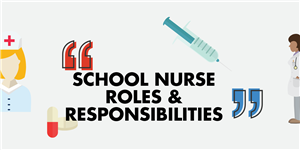- Carver Middle School
- Role of the School Nurse
Role of the School Nurse
-

Definition and Responsibilites of a School Nurse
School nursing is a specialized practice of professional nursing that advances the well-being, academic success and life-long achievement and health of students. To that end, school nurses facilitate positive student responses to normal development; promote health and safety including a healthy environment; intervene with actual and potential health problems; provide case management services; and actively collaborate with others to build student and family capacity for adaptation, self-management, self advocacy, and learning (NASN, 2010).
Who is the School Nurse?
- A registered nurse (RN) licensed to practice nursing by the state board of nursing.
- A professional, accountable to practice in accordance with current Professional Standards of School Nursing Practice, as stated by the National Association of School Nurses (NASN) state laws, rules and regulations
- A nursing professional who advocates for children’s health and safety within the educational setting.
What Preparation Does the School Nurse Need?
- SCS requires that all school nurses be nationally certified from the National Board of Certification for School Nurses (NBCSN). This means that all SCS nurses are highly qualified and take educational courses to renew this license along with their nursing license.
- A School Nurse needs expertise in the following areas:
- Pediatric, public health and mental health nursing with strong health promotion, assessment and referral skills
- Education and health laws impacting children
- Teaching strategies for the delivery of health education to students and staff
What Does the School Nurse Do?
The primary role of the School Nurse is to support student health and academic success. The school nurse is the link between school, students, families, health care and other community providers. The school nurse, with appropriate preparation, takes a leadership role in serving as the coordinator of all school health programs and is has a key role in the WHOLE SCHOOL, WHOLE COMMUNITY AND WHOLE CHILD (WSCC) approach (www.cdc.gov/healthy/wscc/components.htm). School Nurse's role in support of WSCC includes:
- Health Services—serves as the coordinator of the health services program and provides direct nursing care
- Health Education—engages students in actively participating in their health, provides health education to students, staff and parents
- Social and Emotional School Climate—supports the whole child to be healthy, safe, supported, engaged and challenged
- Physical Environment—identifies health and safety concerns in the school environment and promotes a nurturing school environment
- Nutrition Environment and Services—supports healthy food services programs
- Physical Education/Activity—promotes healthy physical education, sports policies and practices
- Counseling Psychological and Social Services—provides health counseling, assesses mental health needs, provides interventions and refers students to appropriate school staff or community agencies
- Community Involvement—actively collaborates with community resources to addressing social and economic barriers to health
- Family Engagement—connects families to school staff, community healthcare providers, and community services to increase ability of students and families to adapt to health and social stressors.
- Employee Wellness—provides health education and counseling, promotes healthy activities and environment for school staff.
What Services Does a School Nurse Provide?
As the health services expert, the School Nurse serves as the health professional for the school community and provides the following services:
- Assessment, planning, intervention and evaluation of students' physical and mental health concerns
- Participating in Individualized Education Plan development and academic team meetings
- Performing pediatric nursing procedures: ventilators, gastrostomy feedings, tracheostomy care, catheterization, medication administration
- Screening for health factors impacting student education and refer to healthcare providers
- Monitoring of immunizations, excluding students with infectious diseases, monitoring school environment for safety
- Education to promote healthy choices: prevention of teen pregnancy, sexually transmitted diseases, tobacco, alcohol and substance abuse
- Case management of chronic diseases (such as asthma and diabetes); working with students, families, and other health care providers
- Creation of Individualized Nursing Care Plans and care for students with disabilities and/or health conditions that interfere with learning
- Participating in crisis team response
- Contributing to school district health policies, goals and objectives
- Liaison to school/community/health care provider
- Providing first aid and emergency care
- Coordinating outside agencies' programs with SCS.

